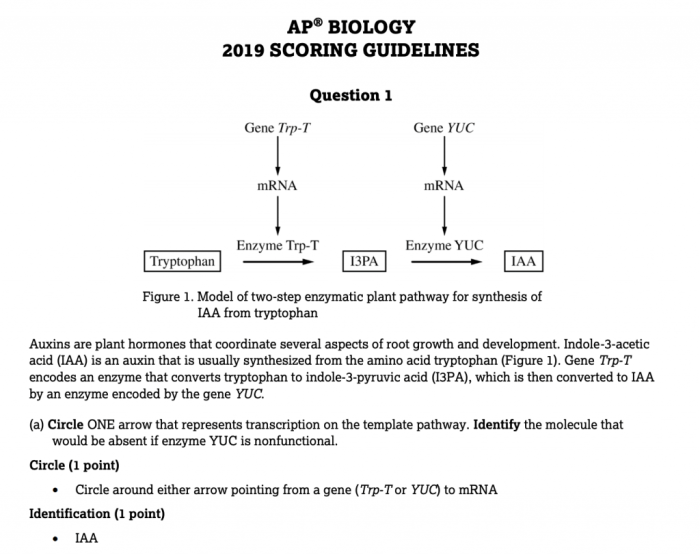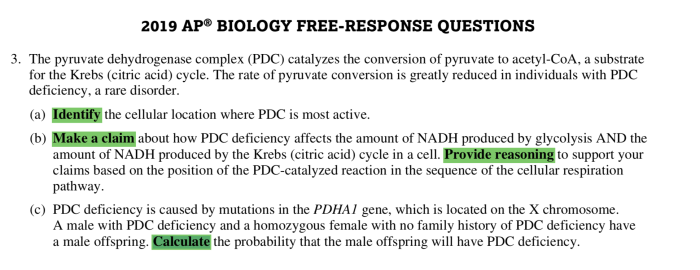Unit 3 progress check frq ap bio – Prepare for the AP Biology exam with confidence with our comprehensive guide to Unit 3 Progress Check FRQ. This detailed analysis provides insights into the format, content, strategies, and time management techniques essential for success on the exam.
Unit 3 of AP Biology delves into the intricate workings of cells, their structure, function, and communication. Understanding these concepts is crucial for answering FRQ questions effectively. Our guide covers key topics such as cell structure, membrane transport, cellular respiration, photosynthesis, and cell division.
Unit 3 FRQ Overview

The Free Response Question (FRQ) section of the AP Biology exam assesses students’ ability to apply their knowledge and understanding of biological concepts to real-world scenarios. It consists of six questions, each worth 10 points, and accounts for 50% of the total exam score.
The FRQ questions are divided into two categories: short answer and long answer. Short answer questions require students to provide concise answers to specific questions, while long answer questions require students to write more detailed and comprehensive responses that demonstrate their understanding of the topic.
Types of FRQ Questions, Unit 3 progress check frq ap bio
- Short Answer:Test specific knowledge and understanding of biological concepts.
- Long Answer:Assess students’ ability to analyze, synthesize, and apply biological knowledge to real-world scenarios.
Content Analysis
Unit 3 of AP Biology covers the following key concepts:
- Cellular Energetics:The processes by which cells acquire and utilize energy.
- Cellular Respiration:The breakdown of glucose to produce ATP.
- Photosynthesis:The conversion of light energy into chemical energy stored in glucose.
- Cell Communication:The mechanisms by which cells communicate with each other.
- Cell Cycle:The process by which cells divide and grow.
Question Analysis
FRQ questions from previous AP Biology exams have covered a wide range of topics within Unit 3. Some common topics include:
- The role of ATP in cellular processes
- The steps of cellular respiration and photosynthesis
- The mechanisms of cell communication
- The regulation of the cell cycle
To answer FRQ questions effectively, students should:
- Read the question carefullyand identify the key concepts being tested.
- Organize their thoughtsand plan their response before writing.
- Use specific evidencefrom the provided information to support their claims.
- Write clearly and concisely, using correct scientific terminology.
Time Management

Time management is crucial during the FRQ section of the AP Biology exam. Students should allocate their time wisely to ensure they have enough time to complete all six questions.
A recommended time allocation is:
- Short Answer Questions:5-7 minutes per question
- Long Answer Questions:10-12 minutes per question
Students should practice answering FRQ questions under timed conditions to improve their time management skills.
Preparation Strategies: Unit 3 Progress Check Frq Ap Bio
To prepare for the FRQ section of the AP Biology exam, students should:
- Review the course contentthoroughly, focusing on the key concepts and topics covered in Unit 3.
- Practice answering FRQ questionsfrom previous AP Biology exams or practice materials.
- Seek help from their teacher or a tutorif they need additional support.
- Get a good night’s sleepbefore the exam and eat a healthy breakfast on the day of the exam.
Expert Answers
What is the purpose of the FRQ section on the AP Biology exam?
The FRQ section assesses students’ ability to apply their knowledge and understanding of biological concepts to real-world scenarios and complex problems.
What types of FRQ questions can students expect?
FRQ questions can vary in format, including short answer, long answer, and data analysis questions that require students to demonstrate their critical thinking, problem-solving, and communication skills.
How can students effectively prepare for the FRQ section?
Effective preparation involves reviewing course material, practicing answering FRQ questions, and developing strategies for time management and organization during the exam.